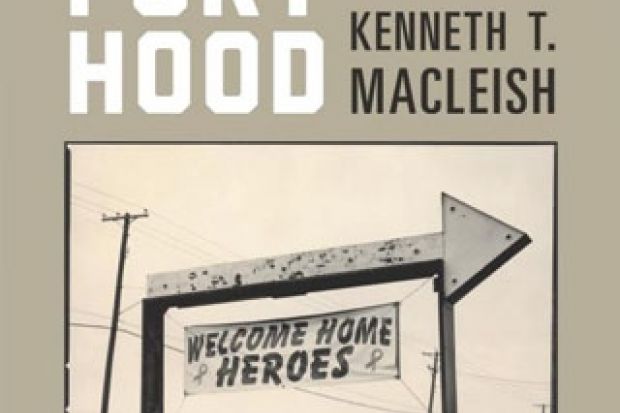This is a difficult book. It is full of details, technical terms, military lingo and medical jargon. Its prose doesn’t flow. But the real difficulty lies in its substance: the narratives of the horrors of combat are tough enough, but the descriptions of the unavoidable annoyances, anguish and the alterations to body, mind and family - to life - are the hardest to take. Why? Because Kenneth MacLeish shows us that there isn’t much that can be done to return these men and women to who they were before their country sent them to war.
This is, therefore, a must-read for anyone whose country sent its people off to fight the unnecessary second war in Iraq. Given its universality, a better title would have been War in the 21st Century and its Personal Costs. Its meaning transcends Fort Hood and the US Army. These could be the stories of almost any soldier from any nation that went to war in Iraq.
The prologue introduces us to a veteran named Dime and sets the sombre tone. Dime survived two improvised explosive device strikes, and was the only survivor of the second one, trapped in his burning tank for four hours. His third IED experience lifted the entire 60-ton tank in front of him off the ground, killing his best friend, whose body, he recounts, was just “gone”.
Later in the book, MacLeish describes soldiers trying to rescue their buddies from another burning vehicle: not to save lives, but to recover something that could be put in a casket. In the process, a soldier’s hand is sliced open, not by a piece of the vehicle, but by the exposed spinal column of a fellow soldier. There are other accounts from soldiers who have seen a friend not just killed but literally destroyed: “transformed from a person into…matter”.
Grotesque in-your-face horror, certainly, but that is just the beginning. MacLeish details the terrible experience that is merely living the life of a soldier in Iraq. Heat, sweat, cold food, no running water, and the torture of wearing body armour, the weight of which, with other equipment, is energy sapping and leaves permanent physical discomfort that is almost impossible to treat. As with psychological injuries, a soldier just lives with the pain.
MacLeish insightfully analyses how the modern apparatuses of war - personal equipment, weapons and vehicles - not only protect the soldier but also put him in greater danger. They allow soldiers to “move to contact” with the enemy: protected, but paradoxically more vulnerable because of the tactics employed; safer, but more exposed and therefore more at risk.
Returning home has its own challenges because of the effects of combat on the soldier - and, importantly, on his family. The reunion process is made more difficult by the Army medical system that in many ways is performing “on-the-job” analysis and treatment, throwing drug upon drug at the problems to see if one or more might help. Then comes the stigma of career-crippling post-traumatic stress disorder, a term inadequate to describe the deep trauma these people endure, day in, day out.
After taking us through the soldier’s experience, MacLeish poignantly asks: “What else is owed on all of this, by what measure, and in exchange for what, exactly?” This book should make us rethink comfortable patriotism - the parades, the flag-waving and the cheap grandstanding of politicians who themselves have never donned a uniform nor seen a loved one do so. We should be made to comprehend what we do when we send our people to fight. Rather than just seeing the advert for the juicy steak on the plate, we should learn, and we should feel, the repulsiveness of the slaughterhouse. Behind those slick TV and glossy print recruiting ads, human beings get vaporised, mutilated and screwed up. And we can’t fix it.
As the tales in this book tore at me, I was reminded of those staged presentations starring George W. Bush with flags and troops as background. The sense of repulsion at using soldiers as part of a political set is intensified by MacLeish’s work. In bringing troops from the background to the front where they belong, this book should be required reading for Bush, Dick Cheney, Donald Rumsfeld and anyone else responsible for sending soldiers to that folly in the desert. They should read it before they go to bed and when they wake up. MacLeish has shown them, and us, what we do to others when we send them to fight our wars.
Making War at Fort Hood: Life and Uncertainty in a Military Community
By Kenneth T. MacLeish
Princeton University Press, 280pp, £19.95
ISBN 97806911545 and 9781400846290 (e-book)
Published 13 March 2013
Register to continue
Why register?
- Registration is free and only takes a moment
- Once registered, you can read 3 articles a month
- Sign up for our newsletter
Subscribe
Or subscribe for unlimited access to:
- Unlimited access to news, views, insights & reviews
- Digital editions
- Digital access to THE’s university and college rankings analysis
Already registered or a current subscriber? Login




